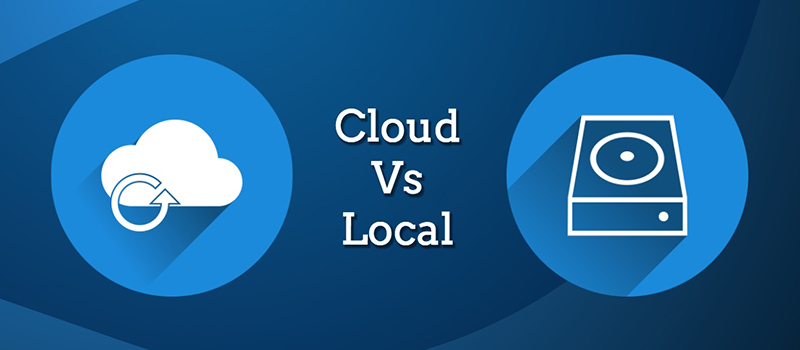Both cloud backup and cloud storage services are representative of a streamlining process that enables ease in work capability. With cloud storage, users are able to keep valuable data stored on a reliable and secure platform to guarantee their data won’t be lost. While cloud backup also serves the same purpose, it is not entirely synonymous with any cloud storage platform. The functionality of the service has a key difference from your typical cloud storage platform. The key features of both service types will be discussed later on, along with outweighing their pros and cons. The main advantage of both platforms is keeping all data stored independently from your computer, so in case any of your workplace or personal data is lost through a computer malfunction or any other unexpected event, users are guaranteed that the backup storage is still stored on the cloud way.
FREE TRIAL FOR 30 DAYS – TRY IT NOW
DO YOU NEED IT?
Before we proceed, it’s important to ask yourself whether you actually need a cloud backup or storage platform. The only question you need to ask yourself is: Is your data worth it? The answer is probably yes. Whether it’s on a phone, desktop, laptop, tablet or any other device, the chances that some valuable information is stored on one of your personal or workplace machines is extremely likely. And like any machine, there’s a high likelihood that it could malfunction and cause a loss of valuable information. But, what if all of this data could be stored away on the internet? So, in a scenario where any such unfortunate event does occur, you’ll always have a backup on the ‘cloud’.
A CLOUD?
A cloud (in technological terms) is a platform that stores information on the internet.
That’s all it is.
The Value of Data
Like oil in the 20th century, the value data holds for the modern economy is immense. Due to the wide spread impact of technology in everyday lives, the magnitude of information being generated is growing exponentially. With this rapid growth of information, the ability to study and efficiently manage it has become necessary and consumed an entire field of study. Whether it’s the workplace or on your personal device, you’re holding on to data. If you fail to acknowledge the importance of what you’re holding on to, you could suffer a potential loss in a number of ways in the near future. By realizing its importance, entire businesses have been formed around analyzing and reusing it in the modern world. It’s the massive volume of information that’s important to consider. The cloud is one by-product of this massive volume of information and exists only because users need to efficiently manage this growing magnitude of information. Your data is important, and it’s up to you to realize its value.
Cloud Backup
Cloud backup services provide an extension on the basic storage capabilities presented by cloud storage platforms. The process works by sending a copy of the original file that’s stored on your computer through the internet, to a server that’s controlled by the third party cloud backup service you are subscribed to. Usually, a fee is charged by the cloud backup service to backup this data on to a cloud platform. The reason is that unlike a cloud storage service, the cloud backup platform is responsible for continuously storing data from your computer on to the cloud. The user purchases a certain amount of storage capacity that is usually higher because of the large amount of expected data that is being upload through an automated process. The advantage this provides is the ability to not have to manually upload information, and users being given the ease to not worry about information being lost at any point of an event that causes the data to be lost on the user device.
Most cloud backup platforms enforce a strict encryption method to protect the user’s private information from unwanted third-parties accessing the data. The information stored is thus secure and can only be accessed by the user. Most cloud backup services also provide limited storage capacity at low costs for users who wish to continuously backup a limited portion of data available on their computer. This provides a large advantage over typical cloud storage platforms in the form of data being backed up all the time. Cloud backup also provides a lucrative opportunity to backup information than the typical process of having to preserve information on tapes and disks. The reasons is such that although the information is being backed up on to another piece of hardware, the data is more prone to being lost in case of any damage to said tapes and disks. While users would feel ease in using tapes or disks to manually store this information, a necessary process would be required to preserve the hardware from being damaged. In contrast, uploading all of this information on to the internet on a secure cloud backup platform will provide the opportunity to not worry about hardware damage. Usually, the files stored on to the cloud are backed up with a number of copies in more than one server, so in case of any event that causes the server to shut down or malfunction, the files are still preserved on the platform on another server. The risk of data being lost on cloud backup services is extremely low, especially when compared with the typical method of tapes and disks. Usually, offices and related organizations choose cloud backup services over typical cloud storage platforms to ensure that the work process is not disturbed in case of any loss of data. The process is one of risk minimization and comfort in working without having to worry about preserving the information all the time.
Cloud Storage
Cloud backup services provide an extension on the basic storage capabilities presented by cloud storage platforms. The process works by sending a copy of the original file that’s stored on your computer through the internet, to a server that’s controlled by the third party cloud backup service you are subscribed to. Usually, a fee is charged by the cloud backup service to backup this data on to a cloud platform. The reason is that unlike a cloud storage service, the cloud backup platform is responsible for continuously storing data from your computer on to the cloud. The user purchases a certain amount of storage capacity that is usually higher because of the large amount of expected data that is being upload through an automated process. The advantage this provides is the ability to not have to manually upload information, and users being given the ease to not worry about information being lost at any point of an event that causes the data to be lost on the user device.
You’re willing to spend, along with how much expected capacity you need to store your files on the internet. This limited storage capacity is a primary reason why users upload their data on a cloud storage platform such as Google Drive or Dropbox manually. This provides users with the ability to manually select the data they’ll need to backup on the internet. While this does seem like an attractive opportunity to manually choose the information you’ll be storing on your cloud storage platform and save costs through limited storage capacity, it can also present itself to be a problem. The major drawback of cloud services of this nature is the unavailability of an automated service that constantly backup information, present a risk in a scenario where the user did not backup the information in a timely manner. It’s a fairly common occurrence where users do not backup their data on the cloud and a malfunction or external event causes the data to be lost. But, this does not imply that cloud storage services
Such as Google Drive, Amazon Drive and Dropbox are entirely useless. In fact, these platforms provide free online backup or low-cost opportunity to manage your files over a mere internet connection, which is why there use is so wide spread and well known. The data is stored on servers located at physical locations around the world, interconnected to make sure that in case of one server being shutdown, the information is preserved somewhere else.
START BY ASSESSING YOUR REQUIREMENTS
Both forms of cloud services provide different functionalities and their usage as such should be dependent on what you need. Take Google Drive for example which acts as a cloud storage service providing a certain limited storage capacity for free cloud backup. If you can handle the hassle of continuously backing up your data from your device to the cloud, you can opt for Google Drive or any similar cloud storage service. While both cloud storage and cloud backup solutions provide low cost limited storage capacity, cloud backup platforms can cost relatively more because of the extended services being provided. In the end, it’s up to you to decide based on your priorities. You can choose the best cloud backup platforms if you’re willing to spend money, but you get continuous backup in return. Cloud storage platforms are cheaper, but hold the risk of data being lost.
The Pros and Cons
Both cloud storage and cloud backup solutions provide a number of benefits to users in preserving data over the internet and minimizing the risk of data loss in case of an unwanted event. But, user requirements always determine whether the convenience provided by the service is of enough use that adapting it would be useful or not. Let’s look at the pros and cons of cloud storage and cloud backup solutions.
The Pros
- Removes barrier of physical-setup costs
- Endless storage capacity
- Ease in data accessibility
- High speed in backing up data
- The cloud can be configured with your system in a short period of time
- More storage space can be purchased anytime
- Low initial cloud backup pricing costs
The Cons
- Increased cost over time
- Vulnerability to data breaches
- Time consuming in terms of data management
- Dependence on the internet connectivity to access data
- Transferring all your data to a new cloud service can be time consuming
THE FUTURE
Expecting what tomorrow holds for data management can be an overwhelming thought. As our dependency on the internet and technology in general grows, the information that’s kept on such mediums must be managed more efficiently. More than ever before, users will need to manage the growing magnitude of information and as such cannot be dependent on one resource to store all of their data. The need to backup everything on to another platform is the smart thing to do and it minimizes the risk in case of any data being lost. Cloud storage and cloud backup platforms are a growing necessity in modern times to manage data in a smart manner and as such present themselves to be a necessity. They provide an opportunity at offsite management of your data, where the data on the back-end is stored in physical data centers. The chances of your information being lost through any of these platforms are extremely low, since a number of copies are made which decrease the probability of loss of information through the cloud. The future is in data and efficiently preserving it. Go to backupeverything.co.uk for more information on cloud backup.



